‘We admire his self-confidence’: what the French think about Napoleon
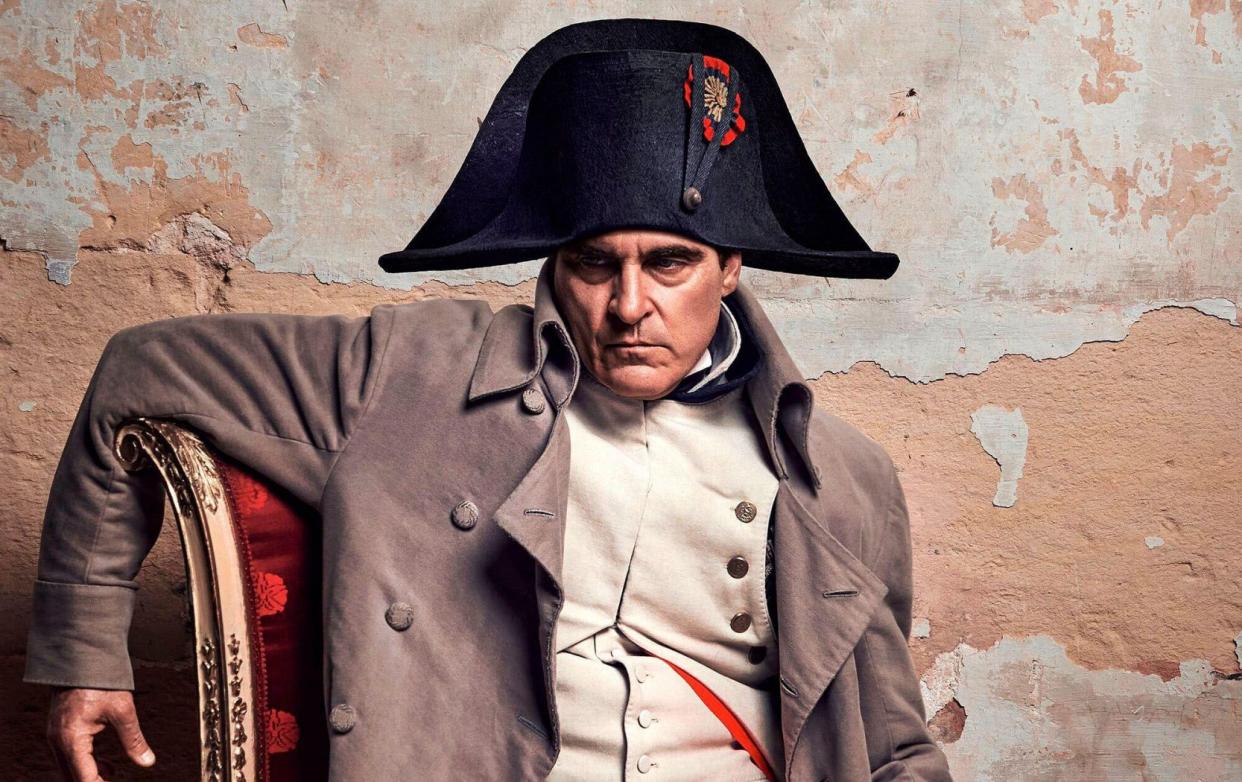
Napoleon Bonaparte arrived on British and French screens once again on November 22, courtesy of Sir Ridley Scott. The British director’s Napoleon – Joaquin Phoenix as the emperor – is scarcely breaking new ground, subject-wise. The Corsican has featured, it is claimed, in some 700 films and 80,000 books. A book or article on him is apparently published somewhere every day. So this is today’s effort.
Scott’s film is epic in scope. Production costs of a reported £160million make it the most expensive he’s ever made. The movie contains six full battle scenes. It is, though, not a hagiography. In an interview, Scott has said: “I compare Napoleon with Alexander the Great, Adolf Hitler, Stalin. Listen, he’s got a lot of bad s—t under his belt.”
Unsurprisingly, the movie has irritated quite a few people across France. The Stalin and Hitler references haven’t helped – but French critics have also alleged many historical inaccuracies. These include, firstly, the central thread that his relationship with the fiercely beautiful Josephine was a key motivating force for his career.

Le Figaro newspaper suggested that the film portrayed “Barbie and Ken under the Empire”. Scott has said he’s not that bothered about such charges – “get a life,” he’s told critics – but it remains pretty unlikely that Josephine was quite as important as shown.
Many French people concede other negative aspects of the emperor’s career. They’ll not be disappointed that the film isn’t adulatory. They concede there is indeed “s—t under his belt”, and about his entire persona. The fellow is divisive, not an unambiguous national hero, like Asterix.
By some estimates, his military campaigns left 900,000 Frenchmen dead. When he thought he was creating a united Europe, he was really fuelling the national sentiments which would see him off. He never developed a taste for democracy or press freedom. Absolutism was one of his things, ruthlessness another. Weighing up the pros and cons is an ongoing business.
As Valérie from Avignon, one of my brighter friends, said: “We admire Napoleon but also are a bit shame-faced about doing so. We’re dismayed by his hots for colonialism and by the enormous armies which went off conquering everywhere and pillaging everything as they went. But we admire his self-confidence, his perseverance, his sense of mission and strategy – and his resistance to the English! We also like the adventurer and the romantic lover of Josephine.
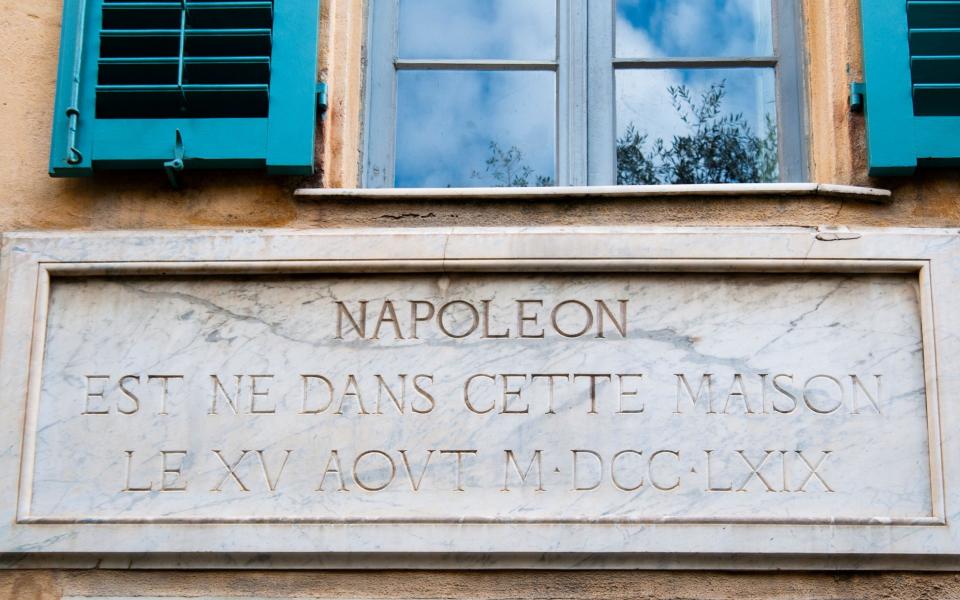
Another friend, Benoît of St Omer, is similarly ambivalent: “He was a dictator, imperialist and war-monger – not the sort of person I usually admire – but he undoubtedly left his mark on the history of France.”
For her part, Vanessa from Clermont-Ferrand, reckons that the debate in France is not about to be resolved now or any time soon: “We’ll still be talking about this when the next film comes out – and the one after that.”
There is, though, one charge which particularly offends 21st-century French sensibilities: that Napoleon restored slavery in French colonies in 1802. This helps explain why Jacques Chirac, always dubious about the emperor, swerved the 2005 bi-centenary commemorations of his greatest victory at Austerlitz.
Clearly, the issue resonates, but it’s knottier than it seems. The abolition, voted by the National Convention in 1794, hadn’t been total. And – here’s the point - neither was the 1802 restoration. The economic and diplomatic circumstances were complex and of their day. Granted, repression of rebelling slaves, notably in rich Caribbean colonies, was severe. That said, most historians deny claims that it amounted to genocide. It is, in short, not demonstrably helpful to see the matter entirely through a 2023 lens.
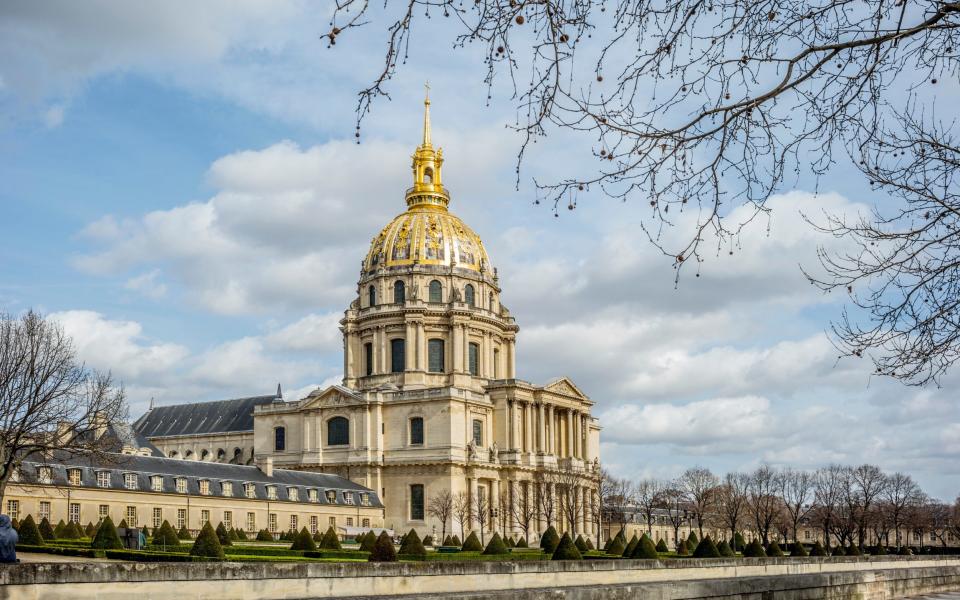
More to the point, Napoleon – unlike Scott’s two other, 20th-century tyrants – left a legacy “subsequently celebrated, embraced and expanded upon,” says Thierry Lentz of the Napoleon Foundation.
Facts bear him out. The difficulty is that Napoleon’s lasting achievement wasn’t winning battles. It wasn’t on the battlefield at all. Napoleon himself recognised that such military success was transient. His enduring legacy was in civvy street – and that’s much less filmable than battles.
The feat was nevertheless prodigious – no less than salvaging from the car crash of the ancien regime, the 1789 revolution and subsequent turmoil, the wherewithal to put the country back together on a solid footing. His code civil created a limpid body of law tidying up the patchwork of feudal laws, and applied to everyone. You’d no longer be immune because you wore a powdered wig. In theory, anyway. The code napoléon, though much-amended, not only remains the basis of law in France, but also influenced legal systems across the globe.
He overhauled the French national and local administration: France’s network of départements, or counties, was his innovation. He instigated the French central bank, a national land registry and religious freedom for Jews and Protestants. Also proper secondary education in the shape of lycées. His initiatives included proper urban planning, sewers, a decent water supply, street numbering and rubbish collection (none of which easily lends itself to epic movie-making).

One certainty is that Napoleon is the most famous French person ever – though General de Gaulle, Joan of Arc and Kylian Mbappé maybe run him close. As such, he’s a gold mine. Just last Sunday, November 19, one of his bicorn hats was sold for £1.69million at an auction at Fontainebleau. The brand name is reckoned to be worth at least a billion euros and, as there’s no copyright, anyone can plunge in. And anyone does.
His name is stuck on all manner of drinks, his likeness on shower curtains and his silk socks reproduced, in a nice case, at five for £220. This says something for his stature. As does Connor Roy’s obsession with the emperor in Succession. Connor named his New Mexico farm Austerlitz (after Bonaparte’s greatest victory), collected Napoleon memorabilia, received the emperor’s love letters to Josephine as a birthday present – and expressed an interest in owning the Napoleonic penis.
Another certainty is that Napoleon’s single greatest bequest to France wasn’t socks or shower curtains or even the code civil. It was the idea that France is grandiose, whatever the reality. The idea of France is, of course, not at all the same thing as France itself. France itself has forever been mired in problems. The idea of France is glory all the way. It’s a hell of a trick to pull off. It still annoys the hell out of the rest of the world. Which is admirable. The fact that we have one more film about the man absolutely underlines the point.
Five traces of Napoleon in France
Ajaccio
Start at the beginning, in Corsican capital Ajaccio. Napoleon was born here on August 15, 1769 – barely a year after Corsica had become French following centuries of Genoese rule and a brief stint of semi-independence. The family home, suitable for minor nobility, has been through many hands since Bonaparte’s day (including those of 18th-century British troops, who wrecked the place) so the emperor’s presence isn’t really discernible. But the house needs seeing.
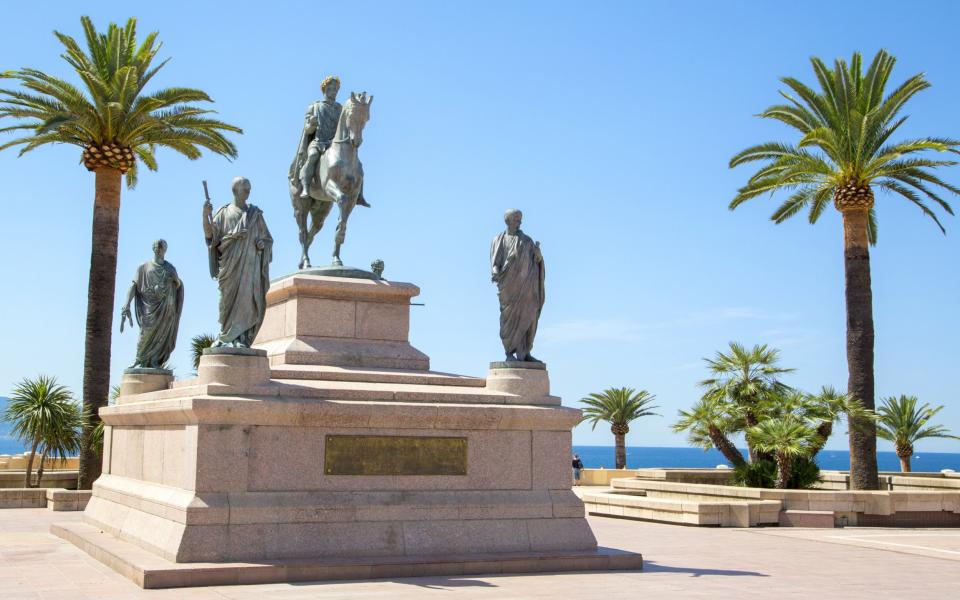
This was where the world’s greatest general (according to Wellington) was born. The museum now in place tells the family narrative clearly (£6). Across town, the very fancy Palais Fesch expands the Napoleonic story. Its gallery also claims one of France’s finest assemblages of Italian art, gathered mainly by one Cardinal Fesch, Bonaparte’s uncle. The holy fellow benefited hugely from his marauding nephew’s art-plundering skills (£7).
Where to stay: Do the job properly, staying at the Hotel Napoleon (doubles from £61).
Paris
Napoleon’s imprint is all over Paris (though – oddly, perhaps – the capital boasts no Rue Napoleon). Unmissable should be Les Invalides, where the ex-emperor’s sarcophagus takes pride of place, with suitable bombast and Russian quartzite, under the famous dome.
Next door, the world’s greatest military museum (£13) has much to say about Napoleon, as about much else. I’d also take the RER A out to Rueil-Malmaison for the Château de Malmaison (£5.50) – essentially, the marital home of Napoleon and Josephine. The fine house and gardens resonate with memories of, especially, Josephine and, for instance, her love of roses. Completists might prefer a Napoleonic walking tour round further imperial highlights – either guided (try viator.com) or by downloading the circuit from parisjetaime.com.
Where to stay: Not far from Les Invalides, the Maison Saint Charles is a one-off – a convent renovated brilliantly in recent years and now hosting chambres-d’hôtes alongside studios and apartments for single mums and other disadvantaged folk.
The gardens are fine, the bedrooms practical, the breakfast good, the vibe light, airy and contemporary – and your £84 or B&B double, as well as being astonishing value in central Paris, helps sustain the good work being done. Win, win and win again.
Compiègne
Compiègne’s neo-classical château was prized by both Napoleon Bonaparte and his nephew, the future Napoleon III. Memories of both, and of their wives (second wife, Marie Louise, in Napoleon’s case) enliven what is an oddly triangular pile (£6.50).

Compiègne demands attention also for a terrific statue of Joan of Arc – she was captured here by Burgundians, and handed over to the English; for the railway carriage in the Rethondes clearing in which Germany surrendered in 1918 and which Hitler insisted as the location for the French surrender in 1940. And for the Memorial de l’Internement et de la Déportation – a wartime transit camp turned excellent contemporary museum (£4).
Where to stay: Stay at the Auberge A La Bonne Idée in nearby Saint-Jean aux Bois. Eat there, too. It’s terrific (doubles from £139).
Elba
Napoleon’s first exile, in 1814, wasn’t much of an exile at all. He was sent to Elba not as a prisoner but as sovereign of the Mediterranean island, off Tuscany. It was a role he set about with gusto.
He appeared to revel in municipal affairs, including the tackling of the stray dogs problem. His principal home was the lemon-yellow mansion Palazzina dei Mulini above the island capital Portoferraio. As palaces go, it was modest – but it allowed Napoleon to stand in the garden and look out to sea.
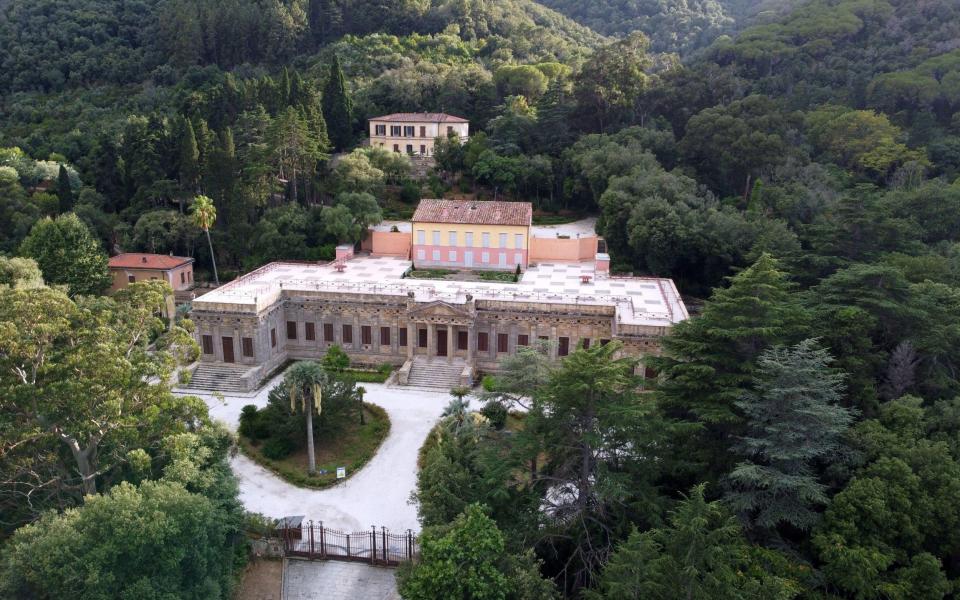
Four miles inland, the San Martino Villa was his country house. It’s misleadingly grand – the posh frontage and gallery were added post-Napoleon by the rich Russian husband of one of the emperor’s nieces – but offers a decent insight into his exile, lovely parkland, a nude statue of Bonaparte’s sister Pauline, a superb Egyptian room and a rare opportunity to buy Napoleonic tea-towels.
Where to stay: There will be fights to Elba from Pisa, Florence and Milan from February 2024. If loaded, head for the five-star Hotel Hermitage on a bay outside Portoferraio (minimum stay five nights, from £1,177). If on a tighter budget, try elbalink.co.uk.
Braine-l’Alleud
Napoleon met his Waterloo not so much at Waterloo as at Braine-l’Alleud, the neighbouring Belgian commune. We refer to “Waterloo” because that’s where Wellington was HQ’ed and from where he wrote his battle report. The inn in which he did so is now a first-rate little battle museum (£13) boasting, among much else, the prosthetic leg fashioned for Lord Uxbridge after his own was blown off (Uxbridge: “By God, sir, I’ve lost my leg.” Wellington: “By God, sir, so you have”).
Over on the battle site itself, you must visit the new Memorial (£4) with all the bells and whistles of contemporary, interactive, multi-sensory museography. There are 226 steps to the top of the Lion’s Mound, so you might want to skip that in favour of the terrific 1912 wrap-around panorama of the battle, or a flip to Caillou Farm, where Napoleon spent the night prior to the battle.
Or a visit to Hougoumont farm, where British troops proved outstanding in the toughest encounters of the battle. The farm bears the battle scars, exhibits and films tell the story and Vivien Mallock’s six-foot high sculpture commemorates the sacrifice (pass for memorial, mound, panorama and farm, £17).
Where to stay: Stay at the Hotel Van Der Valk in Waterloo (doubles from £77).


